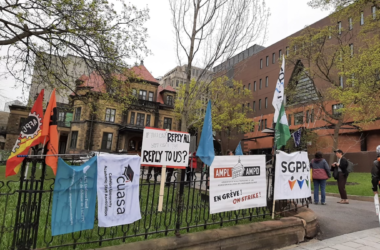This year, Montreal hopes to open its own supervised injection facility, modeled on Vancouver’s InSite. Representatives of the city of Montreal are working on a plan to set up the facilities at preexisting medical facilities throughout the city.
“Traditionally, public health is all about prevention, immunization and vaccination, and health education,” Dr. Nick King, a professor at McGill’s School of Medical Ethics, said.
Rather, supervised injection facilities are a form of harm reduction. Rather than simply targeting drug-seeking behaviour and drug abuse for eradication through abstinence campaigns, harm reduction programs seek to reduce the negative effects of drug usage itself.
There is already a non-profit organization in the city, Cactus Montreal, that seeks to educate and to amass resources for drug users and sex workers. It was originally founded in 1989 as the first needle exchange program in North America.
“Cactus Montreal is an autonomous, nonprofit organisation which helps persons who use illicit drugs, or those with potentially risky sexual behaviour, to reduce the risks associated with those practices while improving their quality of life,” its website says.
“Rather than taking charge of people, Cactus’ goal is to empower them to regain control over their lives and to present them with choices so that they become ‘acting subjects’ once again. It is a global, generalist approach without restrictions, which allows the creation of egalitarian relationships that consider the whole person,” the website adds.
From the last year for which statistics are published (2008-2009) Cactus reports having over 25,000 visits. Over that time period, Cactus also distributed 308,777 sterile needles to patients both at its site and on the streets.
There is a concern from those who would use the proposed public facility that their drug usage would become a matter of public record.
“It’s a different approach to public health,” King said. He added that it attempts to reduce harms that accompany drug use. Similar to how a helmet protects a cyclist or a seatbelt saves passengers in collisions, supervised injection facilities save people’s lives.
The two main camps in favour of and in opposition to supervised injection facilities disagree on two main issues: illicit drug use, and the reduction of deterrents against illicit drug use.
Those in favour of the facilities are generally “agnostic about what the activities are,” said King. Saving people’s lives is more important. King added that other positive benefits include cleaner streets because of fewer dirty needles being tossed around, as well as lowering long-term health care costs.
He did caution, however, that despite little evidence in support of these claims, most recent studies do support the idea of an economic benefit to the health care system as a result of these facilities.
The program’s opposition, meanwhile, hinges on the possible promotion of drug use by removing deterrents from the equation, and also the use of public funds to make illegal activities safer.
In the last few weeks, the Canadian Supreme Court squashed the Conservative government’s hopes of shutting down the only supervised injection facility in North America, InSite, and Quebec’s Health Minister, Yves Bolduc, announced a new provincial initiative to provide services for drug abusers.








